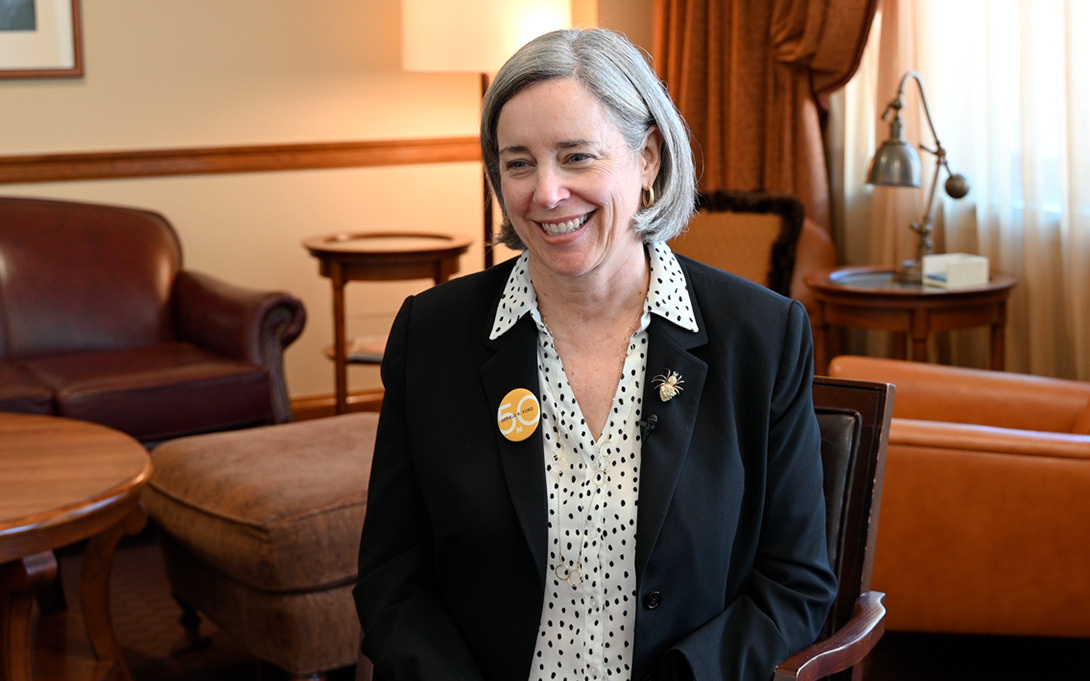
Stacy Dean (’88, MPP’92), admits that the decision to attend the University of Michigan wasn’t the most thought-out process. Coming from a small town in New York, she simply wanted to go somewhere new.
“It was the school that was furthest away from where I grew up that accepted me,” she says laughing. “And I thought, ‘OK, I’m going to get out of here.’ It was best non-logical decision I ever made in my life.”
Dean, who served as the deputy under secretary for the U.S. Department of Agriculture’s food, nutrition, and consumer services since 2021, credits her time at U-M and Ann Arbor for finding a passion for public service.
“I think I wanted to be in international affairs. I didn’t know if I wanted to work at the state department, be a spy, or work for Catholic relief, but growing up in a small town, I just wanted to keep exploring the world,” Dean says.
But after getting her degree in Russian and East European studies, Dean went to work for an architect in Ann Arbor.
“I loved my job and boss, but all of my energy was going into his pocket. I wanted to be part of something bigger than that. And that’s why I applied to public policy school,” she says.
After graduating with a master’s degree in public policy from U-M, Dean became a budget analyst for the White House’s Office of Management and Budget, spending time tracking the impact of cuts to food assistance programs following the passage of legislation under President Bill Clinton.
She says that work was difficult because she never got to see the good things that were happening around food insecurity. So she went to work at the Center on Budget and Policy Priorities food assistance team, rising to become vice president for food assistance policy before being tapped by the Biden administration to work at USDA in January 2021.
Dean says both her area studies and public policy degrees taught her how to unpack problems and think creatively for solutions.
She returned to U-M this spring to give a talk to students at the Ford School for Public Policy on tackling nutrition insecurity and systemic racism in the food system.
“Food insecurity and diet-related diseases are things that are experienced far too often in this country,” Dean said during the talk. “But the rates and who experiences these things is quite different by demographic group. … That hardship is not equally experienced. So reducing the number isn’t enough, you’ve got to reduce the disparity in who is experiencing it.”
Dean said one way of doing that is to look at the issue holistically. For instance, if we do better as a country in terms of housing or income, food insecurity and hunger are lowered.
“Hunger is an expression of hardship, it’s an expression of inequity,” she said. “And the mission of trying to make sure that we live in a community, neighborhood, or country where people don’t go hungry — it gives me purpose in my work.”
Now, Dean is headed back to the nonprofit sector, joining the new José Andrés-backed Global Food Institute at The George Washington University as its first executive director.
“It’s a brand new institute at GW University that is really trying to look at all kinds of issues through the lens of food,” Dean recently said during the Wall Street Journal’s Global Food Forum about the new job. “[Andrés] has really talked a lot about how food is culture, food is love, food is peace, but the lack of food can also be a representation of our climate crisis, our public health crisis, and international strife. The institute is being set up to try to think of food as a unifier to tackle some of those big issues.”
Written by Jeremy Carroll, Alumni Association of the University of Michigan.